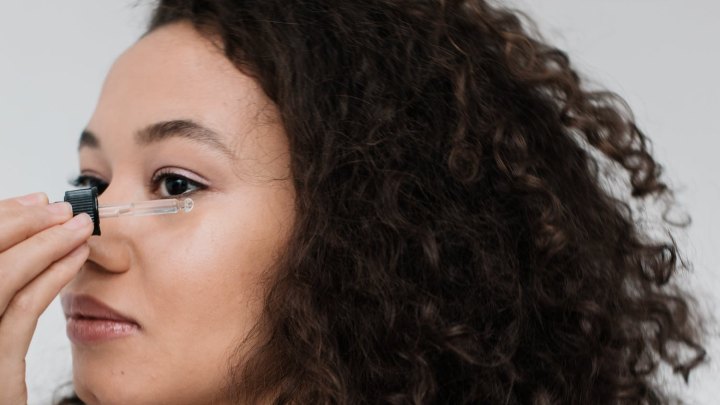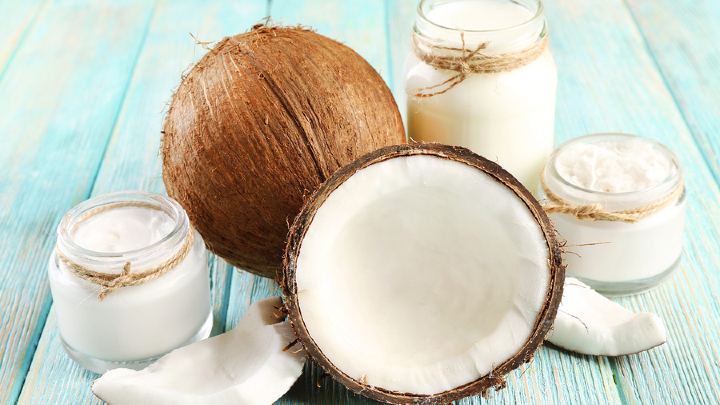A few years ago, coconut oil was only used for cooking. Nowadays, coconut oil is used for many things. People even use coconut oil on their faces. However, is it safe to use coconut oil on your face? Find out the answers to these questions and many more in this article.
You can use coconut oil on your face. Being natural, it acts as a great moisturizer without the added chemicals of cosmetic products. This oil also has some powerful therapeutic properties, so you can use it for more complex skin problems.
This article will help you learn more about coconut oil. This includes its benefits, side effects, and how you can incorporate it into your skincare routine to moisturize your face and give it a healthy glow. Read on to discover.
What is coconut oil?
Coconut oil is a plant lipid that contains fatty acids, vitamins, minerals, and antioxidants. It is extracted through several processes from the kernel or flesh of ripe coconuts harvested from the coconut palm (Cocos nucifera).
“Coconut oil is a natural emollient that helps keep your skin healthy by softening and soothing it. It consists of many different compounds, but the most important are lauric acid, myristic acid, and palmitic acid,” explains Dr. Alan Durkin, a board-certified dermatologist.
These three, combined with the other compounds in coconut oil, hydrate the skin, protects it from free radical damage, and soothe irritation from rashes, bug bites, sunburns, or other skin irritations.
Best coconut oil for face
There are mainly two types of coconut oil: Virgin coconut oil and refined coconut oil. Although both types are similar and beneficial to your health, the difference is in their processing.
Virgin coconut oil is pure and unprocessed. It comes from the flesh of the mature coconut and is made without the use of any heat or chemicals. On the other hand, refined coconut oil has been processed, altered, and stripped of many of its nutrients.
“The choice is clear: choose virgin coconut oil for your face. It contains a high concentration of medium-chain fatty acids and antioxidants which help to reduce inflammation, moisturize and fight signs of aging,” Dr. Durkin explains further.
A study published in the Journal of Cosmetic Dermatology also revealed that after 8 weeks of observation, participants who used virgin coconut oil experienced an increase in skin smoothness and hydration compared to those who used refined coconut oil.
Coconut oil for skin whitening
People have been using coconut oil for centuries to whiten their skin. It is rich in antioxidants, which can help fight free radicals that cause dark spots on the skin. It is also a natural moisturizer, which is a big plus for those with dry skin.
Coconut oil also contains lauric acid, capric acid, and caprylic acid, which help maintain the skin’s elasticity. These acids also help exfoliate the skin by breaking down dead skin cells, making them shed at a faster rate.
“Coconut oil is not only rich in fatty acids, but it also contains nutrients like vitamins which penetrate deep into the skin to nourish it and prevent signs of aging like age spots, fine lines, and wrinkles,” board-certified dermatologist, Dr. Leslie Baumann explains.
Can you use Coconut oil for oily skin?
Coconut oil is good for oily skin because it contains antifungal, antiviral, and antibacterial properties.
These properties make it a great option for fighting acne, causing bacteria, and preventing breakouts on the face.
However, coconut oil can also cause problems for oily skin. It is made up of mostly saturated fat – which means it can clog your pores and cause breakouts. It can also increase the production of sebum by over 40 percent, which means more oils on your face.
“It’s a 50-50 chance. Coconut oil can cause acne, and it can also help you get rid of it. The result varies for every individual. If you’re concerned about your acne or oily skin, you can try aloe vera as an alternative to coconut oil,” Dr. Baumann explains.
Benefits of coconut oil for face

Hydrates skin
You can find coconut oil in most moisturizers and other skincare products due to its ability to penetrate deep into the dermis to hydrate the skin. It also contains lauric acid, which helps to retain moisture in the innermost layers of your skin.
Soothes sensitive skin
The lauric acid present in coconut oil makes it an excellent moisturizer and healing agent for sensitive skin. It also contains antibacterial and anti-inflammatory effects that help to soothe sensitive skin even more.
Reduces inflammation
Coconut oil is a rich source of vitamins and medium-chain triglyceride fatty acids. These fatty acids work as an anti-inflammatory agent by blocking enzymes that produce a group of chemicals called “prostaglandins.”
Your immune system releases these chemicals in excess whenever you have an infection, allergic reaction, or damage. This causes inflammation on your skin, which, of course, can be remedied with coconut oil.
Exfoliates skin
Coconut oil contains glycerin and fatty acids, which help to exfoliate the skin by drawing out dead skin cells, excess oil, and impurities from the skin.
It also helps to moisturize your skin without leaving a greasy residue, which explains why it’s mostly used in face scrubs and face cleansers.
Prevents wrinkles and fine lines
The medium-chain fatty acids in coconut oil are antioxidants that can help fight off free radicals that can cause premature signs of aging, like wrinkles and fine lines.
They also help to stimulate the production of collagen, which is responsible for maintaining skin elasticity. As a result, your face becomes plumper and less prone to developing signs of aging.
It’s antibacterial
In addition to its many benefits for the face, coconut oil possesses antifungal and antibacterial properties that can help fight against fungi and bacteria on the skin.
For example, it contains lauric acid and palmitic acid, which are antibacterial ingredients that help to cleanse your pores by removing acne-causing bacteria and other harmful microorganisms.
Promotes wound healing
Coconut oil is a good, inexpensive, and natural alternative to common treatments for wounds and cuts. Its antibacterial properties help to fight off bacteria, hence promoting wound healing.
When applied to a cut on the face, coconut oil boosts the healing process, reduces the risk of infections, and prevents the formation of scars on the skin.
Relieves eczema
Due to its moisturizing and antibacterial properties, using coconut oil is an effective way to moisturize the skin and fight off dry skin conditions like eczema.
It also contains a high level of antioxidants, which help to fight off free radicals and reduce the severity of eczema symptoms such as flakiness, redness, and irritation.
Sunscreen
Coconut oil, in its own little way, offers SPF protection for your skin. It is a natural sunscreen with an SPF range of about 4-6. It doesn’t replace your regular sunscreen, so always ensure to wear sunscreen with at least SPF 30 before you head out for the day.
How to use coconut oil as face moisturizer
- Pour a few drops of coconut oil into your hands.
- Rub your hands together to heat the oil (this melts the oil, making it easier for your skin to absorb).
- Apply the oil to your face and gently massage in small circular motions.
- Leave it for 10-15 minutes before rinsing off with warm water.
It’s recommended to leave coconut oil on your face overnight if you have dry skin.
FAQs
Can coconut oil make your skin glow?
Yes, it can.
Coconut oil contains vitamin E and some essential fatty acids that can penetrate deep into your skin layers and help remove dead skin cells that cause dull skin.
These fatty acids also penetrate deep into your skin’s surface to increase the production of collagen, thereby preventing signs of aging such as wrinkles and fine lines on the face.
Can coconut oil moisturize your skin?
Yes, it can.
The high content of fatty acids renders coconut oil an exceptional moisturizer that penetrates deep into your skin to moisturize it. It can also help soften dry, rough patches of skin caused by conditions like eczema or psoriasis.
And unlike most commercial moisturizers, coconut oil is all-natural and doesn’t contain any fragrances or ingredients that can damage your skin. It also helps to eliminate signs of aging and makes your skin soft and smooth.
Can you use coconut oil to treat eczema?
Yes, you can.
Coconut oil has antibacterial and moisturizing properties, which make it an excellent option for treating dry skin conditions like eczema.
It is also rich in fatty acids, which help restore the natural pH mantle in your skin and promote the shedding of dead skin cells.
Conclusion
Using coconut oil for your face can be a great way to keep your skin looking smooth, healthy, and radiant. It is full of antioxidants that are effective against signs of aging, protecting both the skin and the underlying muscles.
Moreover, coconut oil is a natural moisturizer with antibacterial properties that can kill bacteria and leave your skin feeling smooth and hydrated. It is also a natural sunscreen and can help protect your skin from harmful UV rays.
However, coconut oil comprises natural fatty acids, which makes it rather heavy for oily skin. So, if you are using coconut oil for your face, ensure to do a patch test before slathering it on.
Thanks for reading.
You can get more helpful tips here on MBGON.
